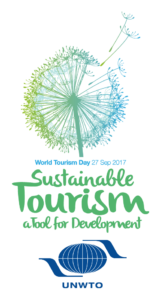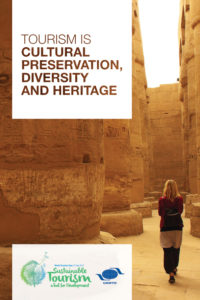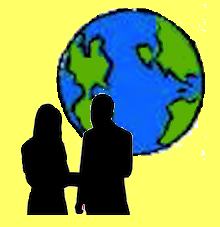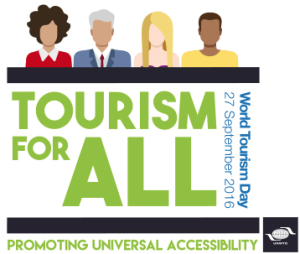 September 27 is World Tourism Day, as designated by the United Nations. In fact, 2017 is the International Year of Sustainable Tourism for Development. World Tourism Day is meant to foster awareness of the importance of tourism and its social, cultural, political and economic value. The celebration also seeks to highlight tourism’s potential to contribute to reaching the Sustainable Development Goals (SDGs).
September 27 is World Tourism Day, as designated by the United Nations. In fact, 2017 is the International Year of Sustainable Tourism for Development. World Tourism Day is meant to foster awareness of the importance of tourism and its social, cultural, political and economic value. The celebration also seeks to highlight tourism’s potential to contribute to reaching the Sustainable Development Goals (SDGs).
The theme of World Tourism Day this year, 2017, is Sustainable Tourism – a Tool for Development. And for my friends in the USA who may not understand: by “development”, they mean community development, economic development, preservation of historical sites while opening them up to tourism, etc.
I’m joining the celebration online by writing this blog that you are reading now, by taking the pledge to #TravelEnjoyRespect and by using the various images and other tools available for free from the United Nations World Tourism Organization in my social media messages today. The images are provided in multiple languages.
 I love to travel. I have been privileged enough to travel internationally a great deal, both through my work and for entirely personal reasons. Travel gives me hope in humanity, because of the incredible kindness I experience. Travel gives me a sense of wonder, because of the incredible natural beauty and human-made marvels I see. Travel gives me a sense of brotherhood with all humans, because of the various representations of history I encounter. I want all people to get to experience this, particularly women. And the economic benefits to local communities regarding tourism are real and something I very much want to support.
I love to travel. I have been privileged enough to travel internationally a great deal, both through my work and for entirely personal reasons. Travel gives me hope in humanity, because of the incredible kindness I experience. Travel gives me a sense of wonder, because of the incredible natural beauty and human-made marvels I see. Travel gives me a sense of brotherhood with all humans, because of the various representations of history I encounter. I want all people to get to experience this, particularly women. And the economic benefits to local communities regarding tourism are real and something I very much want to support.
I created a web page called transire benefaciendo: “to travel along while doing good.” I believe that every traveler has the power to do good on their journey. Here are 14 easy ideas for transire benefaciendo: eating in local restaurants, buying locally-produced products as much as possible (local beer and wine can be AWESOME), being as polite as possible, being quiet in sacred spaces, learning to say “thank you” in the local language as soon as possible, talking with local people about their lives and their work, taking the tour of something truly local (like a local history or local art museum), never paying for something that is endangered or leads to endangered animals (like ivory), never paying to touch a wild animal, refusing to ride elephants, never taking photos of children no matter how cute they are without their parents’ permission, paying appropriate prices for things and not trying to bargain in inappropriate situations/areas with extreme poverty, insisting on throwing away my trash possibly no matter how much a guide says it’s okay to throw it down on the ground, and never defacing anything with graffiti.
Showing respect and interest is appreciated worldwide. It creates a positive image of others from your country and ALL travelers from abroad. Talking with local people can lead to beautiful moments. One of my favorite travel memories is returning to my hotel room in Afghanistan after being away for a week and having the cleaning lady take my hand in the hallway and lead me to my room, so she could show me it had been painted, and have her rub my hands over and over saying, “Welcome! Welcome!”, the only English phrase she knew besides “Good morning.” Refusing to pay to touch wild animals, including riding elephants, encourages people making their living from forcing these animals into such horrible lives to seek other ways of employment. Buying locally-produced items, including food, helps the local economy. It doesn’t seem like much, but it DOES make a difference!
I have some resources for people in developing countries that want to expand their tourism offerings:
Adventure tourism as a tool for economic & community development by me! This is a resource for those that like to explore developing countries / low infrastructure environments, as well as offering more about why I make travel a priority in my life.
Hosting International Volunteers. I’m not crazy about voluntourism, but if you want to host volunteers from other countries, here are things you need to do.
Advice for Budget Hotels, Hostels & Campgrounds in Transitional & Developing Countries: The Qualities of Great, Cheap Accommodations. I love small hotels when I travel. I wish more locals knew how to create a great site.
You can also help promote the day by using these tags in your tweets, Facebook posts, Instagram posts, and other social media posts using these tags:
#WTD2017
#IY2017
#TravelEnjoyRespect
#SDGs
Related blogs:
- J.K. Rowling speaks out against orphan tourism
- The harm of orphanage voluntourism (& wildlife voluntourism as well)
- Isn’t my good heart & desire enough to help abroad? No.
- Realistic tips for volunteering abroad
- Vetting Organizations in Other Countries
- Safety in International Volunteering Programs
- humanitarian stories & photos – use with caution
- vanity volunteering – all about the volunteer




